Our Performances
All our performances are in Russian, but we would like to use this opportunity to write about our repertoire in some detail, especially since from 2010 we are preparing subtitles for all our new projects.
One-actor performances by M. Ferentsev

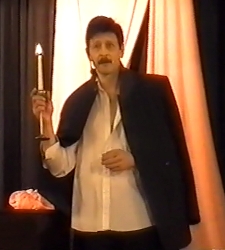 Before A.R.T. came into being as an official organisation, our director Mikhail Ferentsev has introduced to public three of his solo works, in which he was assisted by Igor Yatsenko with sound and music arrangements and by Nick Iassenev with stage lighting. These one-actor performances include "Russia - The Silver Century", "Performing Classics", and "Light of a Distant Star".
Before A.R.T. came into being as an official organisation, our director Mikhail Ferentsev has introduced to public three of his solo works, in which he was assisted by Igor Yatsenko with sound and music arrangements and by Nick Iassenev with stage lighting. These one-actor performances include "Russia - The Silver Century", "Performing Classics", and "Light of a Distant Star".
"Russia - The Silver Century" is based on works of great Russian poets of the beginning of 20th century, such as Igor Severyanin, Nikolay Gumelyov, Anna Akhmatova, Vladimir Mayakovsky, Boris Pasternak, Osip Mandelshtam, Maximilian Voloshin, Marina Tsvetaeva, Sergey Esenin, Ivan Bunin, Alexander Blok, Il'ya Erenburg, Zinaida Gippius, Alexander Vertinsky. Similar to how Pushkin's epoch (the first third of the 19th century) was named "The Golden Century", the times of which the performance narrates were christened "The Silver Century". These were very troubled years in the political history of Russia, but in cultural terms they gave rise to many great poets, both professional and amateur, as well as to culturally keen and aware audiences, listeners, readers, and critics.
"Light of a Distant Star" is based on poetry of Mikhail Ferentsev himself. It includes a collection of works written by Mikhail over the years - recently, ten or twenty years ago - both in Russia and Australia. The author mentions that he does not consider it be a poetry in its pure form, but rather a collection of thoughts, ideas, bard texts that really do not even need to be written down, since they are so closely related to a specific event, sentiment, or life experience.
See also (in Russian): video of "Russia - The Silver Century", poetry from "Light of a Distant Star"
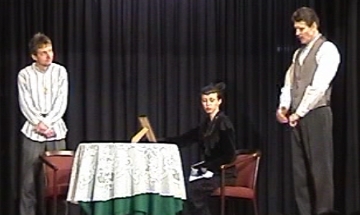
"The Bear"
a comic sketch by Anton Pavlovich Chekhov
"The Bear" in a characteristic Chekhov's way tells a witty and hilarious story about a lady land-owner Elena Popova, seemingly in a deep mourning over her long gone husband, the lady's servant Luka, and a handsome and very self-confident land-owner Grigory Smirnov, who comes to collect Elena's husband debt and unexpectedly falls under her irresistible charms. Chekhov completed this one act comic work in 1888, and it was performed over the years with great acclaim.
"Strange People"
a stage adaptation of three stories by Vasily Shukshin
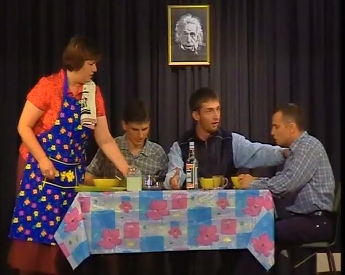 This stage adaptation is based on three of Shukshin's stories about those he purposely calls "strange people": common villagers, who refuse to conform with their predominantly ordinary and uninspiring environment. What they do is outside of the expectations of the majority of people around them. They are often misinterpreted and misunderstood, and, though they are quite simple and naive in their actions and desires, their inner world stretches far beyond the worlds of those that surround them.
This stage adaptation is based on three of Shukshin's stories about those he purposely calls "strange people": common villagers, who refuse to conform with their predominantly ordinary and uninspiring environment. What they do is outside of the expectations of the majority of people around them. They are often misinterpreted and misunderstood, and, though they are quite simple and naive in their actions and desires, their inner world stretches far beyond the worlds of those that surround them.
The first story "Microscope" tells about a simple man who uses his entire salary to purchase a microscope, a seemingly useless gadget for his everyday life, which he himself is not too confident what to do with. The next story "Boots" is again about an ordinary country bloke who encounters a seldom seen pair of beautiful high-heel boots in a local shop and decides to pleasantly surprise his wife. The only problem is that the shoes he buys are too small for his "lady", but how touching it is nevertheless for her to realise that her husband cares for her amidst the so-to-speak commonly accepted married life indifference. The final story "Styopka" talks about a young man who escapes from prison just three month before his official release. He simply comes home to see his family, including his mute sister, who loves him very much, and they, unaware of any further details, through a banquet in his honour. "I just could not resist being tortured by dreams every night", he explains to the fellow-villager policeman, who came to arrest him in utter disbelief.
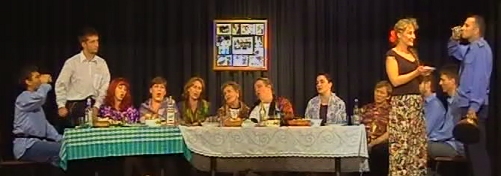
See also (in Russian): photos & articles, video
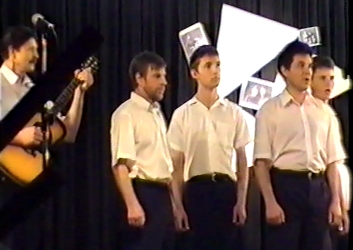
"Remembrance, Remembrance..."
a musical-poetic composition dedicated to 60th anniversary of Victory in the Great Patriotic War (World War II)
Certainly there is not a single family on the territory of the former Soviet Union that has not been affected by this war. Our relatives fought and died on the battlefields, worked tireless nights for the army back at the home front, and waited for their loved ones to return. A country (that is - common people) that went through so much hardship has not only overthrown the "invincible" German machine and protected its own land, but also liberated Europe from the aggressors. This Victory is sacred not only for those who fought in the war, but also for all of us - their descendants. We remember them, their wartime poetry, the stories about their experiences and heroism.
See also (in Russian): photos
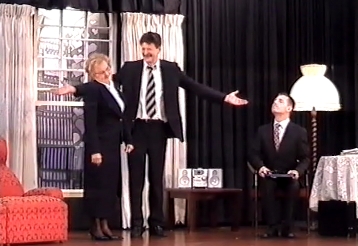
"Out of Order"
a comedy by Ray Cooney
Russian title - "Him, Her, a Window, and a Dead One"
This comedy (originally in English) was completed by Ray Cooney in 1991. It tells about a UK minister, who has to lie his way out of an embarrassing situation - a planned adultery with a secretary - with the help of an innocent minister's personal private secretary, who gets more and more embroiled in the increasingly tangled tale improvised by the lead character as events unfold. The action takes place in a suite in a posh London hotel and revolves around accidents caused by a defective sash window.
See also (in Russian): photos & articles, video
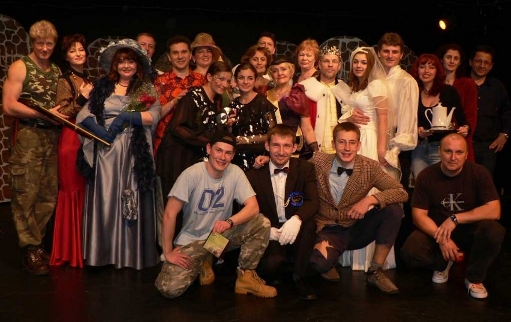
"An Ordinary Miracle"
a musical tale by Evgeny Shvarts
This wonderful fairy tale is about the miracle of love - something that naturally comes into all of our lives at some point. It comes and it is able to perform... well... miracles. The ordinary and the extraordinary are both combined in this tale of adventures of two youngsters in love - the bear and the princess. Quite naturally everybody around them either helps them to or tries to prevent them from being together: the wizard, the king, the king's ministers, the tavern-keeper, the hunter, the hunter's apprentice, the lady-in-waiting, and so on.
The number of creative talent employed in this production is quite amazing: actors themselves, dancers from the Sydney dance studio "Russian Souvenirs", poetry of Mikhail Ferentsev and Veronika Buchatskaya-Ostin, music of Igor Yatsenko, work of professional vocalists from Alma-Ata (Kazakhstan), graphics, stage, costume design, and so on.
"Before the Roosters Call Thrice"
a parable by Vasily Shukshin
Shukshin completed this work in 1975. Initially it is set in a library, where a bunch of Russian literature books (in other words, their characters) start discussing among themselves the fate of Ivan the Fool, a main representative of common folk in Russian fairy-tales. Ivan is typically a seemingly good-for-nothing simple-minded ordinary country bloke who, when pushed, plays his wit, cleverness, cunningness, strength, persistence, ability to attract luck, destroy villains, save kingdoms, find love, as well as put to use his other numerous talents. Shukshin's work, however, is a true parable. It has this touch of tragedy and absurdism to it, portraying how Ivan, a common folk, is pushed around by those who "know better", those who possess power. Ivan rebels, yet gets subdued by less talented and more self-centred around him. He often does what he is told, even when something makes no sense to him. The play portrays a whole gallery of social types, and it is of great value because of its urgency, topicality, and authenticity in modern times.
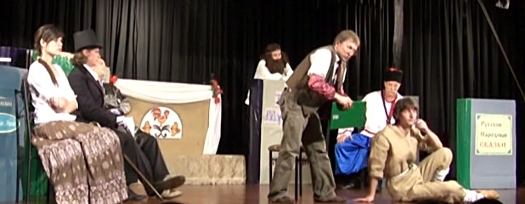
See also (in Russian): photos & articles, video
"Private Soldiers"
a ballad by Alexey Dudarev, dedicated to the 65th anniversary of Victory in the Great Patriotic War (World War II)
The setting for this play is best illustrated by a few sentences heard at the very beginning of the performance. "If we honour the memory of every person who died during the Second World War with a minute of silence, we would be silent for 82 years... An army can win a battle, an army can lose a battle... Victory is achieved by the entire nation... The events of which we are about to tell took place at the very end of that horrific war... It was April 1945 Anno Domini..."
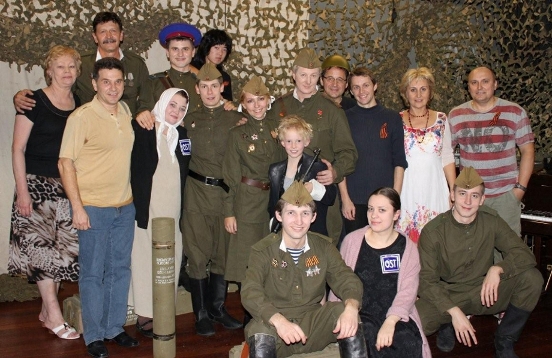 Alexey Dudarev tried to write a play about the war in such a way that it would not put blame on anyone's shoulders, would have no affectedness, political propaganda, and so on. This is a story about the last days of that war, about ordinary Russian soldiers who were able to protect and carry on humanity in very harsh conditions, in an environment that most of us these days would find unbearable. The play is about faith, faithfulness, love, honour, and dignity. It is a ballad about the great sacrifice of people who defended their country and emerged victorious.
Alexey Dudarev tried to write a play about the war in such a way that it would not put blame on anyone's shoulders, would have no affectedness, political propaganda, and so on. This is a story about the last days of that war, about ordinary Russian soldiers who were able to protect and carry on humanity in very harsh conditions, in an environment that most of us these days would find unbearable. The play is about faith, faithfulness, love, honour, and dignity. It is a ballad about the great sacrifice of people who defended their country and emerged victorious.
"Private Soldiers" introduces an amazing variety of characters: young and old, men and women, victims and fighters, those full of hatred and vengeance for the families they have lost and those who are able to forgive, those who are new to the war and those who went through everything it has to offer, those who survive and those who do not, those who believe in God despite of it all... The work raises such deep philosophical questions as "What does it mean to be a human being?", "Do we have the right to kill and to judge?", "How is one affected by war and why?"...
"Private Soldiers" marks two important milestones in the history of our theatre. Firstly, it was our first work, which we were invited to perform in front of non-Sydney audiences - in Melbourne and in Canberra. Secondly, it was our first work purposely intended for English speaking audiences, since it came with complete set of on-stage subtitles.
See also (in Russian): some photos & articles, photos, radio interview
"All About Love and Marriage"
a number of comic sketches based on works by Anton Pavlovich Chekhov
The second half of this play is nothing other than Chekhov's sketch "The Bear", described above. The first part includes three other Chekhov's works: "A Suitor and a Father", "A Silly Bride, or A Retired Captain", and "A diplomatist", which humorously and wittily (sometimes with a twist bitterness, so typical for the Russian literature), span over the topics of love and marriage.
See also (in Russian): radio interviews


